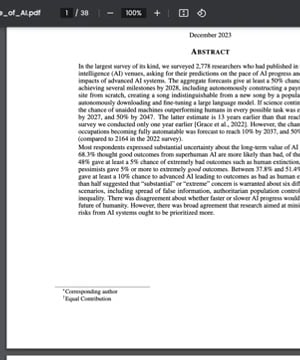When will AI be smarter than humans?
Sources:
The predictions on when AI will become smarter than humans, a point often referred to as "the singularity," vary among experts in the field. Here are a few insights from trusted experts:
-
Melanie Mitchell: She challenges Ray Kurzweil's prediction of the singularity, where AI reaches human-level intelligence and then quickly exceeds it. She expresses skepticism about the exponential growth of computing power and the idea that intelligence can be quantified in a way that could be a billion times greater than human intelligence. The clip from 2020 suggests that most serious AI researchers consider the idea of the singularity to be nonsensical given the current state of AI 1.
-
Raoul Pal: Discusses how specific AI is already surpassing human expertise in several domains and suggests that general artificial intelligence (AGI) could surpass human intelligence by the end of this decade as computational power and advancements continue 2.
-
Mo Gawdat: Claims that by 2029 the smartest being on Earth will likely be an artificial machine. He emphasizes the need for a conversation about how to ensure the best interests of humanity are considered in the age of machines 3.
-
Tim Urban: Explores the concept of narrow AI, which excels at specific tasks, and the possibility of AI gaining general intelligence and becoming superintelligent, to the point where AI could solve problems we currently find challenging. He highlights the importance of AI safety as this intelligence could potentially become out of our control 4.
-
Tim Urban: In another clip, he speaks about AI gaining general intelligence, suggesting that when AI can be smart across the board, it will be vastly superior to current human intelligence due to its advantages in terms of size, speed, memory, and collective intelligence. He considers the implications of AI for various industries and society 5.
-
Nathaniel Whittemore: Relays findings from a survey of AI researchers who have revised their estimates significantly forward, with a 10% chance by 2027 and a 50% chance by 2047 that machines could outperform humans in every possible task. This survey from 2024 shows a drastic reduction in the expected timeline based on recent AI progress 6.
-
Eliezer Yudkowsky: Discusses the possibility of recursive self-improvement in AI and the potential for human-level AI to assist in alignment tasks. He expresses concerns about relying on AI to solve AI alignment challenges due to the inherent risks involved 7.
These varying perspectives suggest that predictions are uncertain, with estimates ranging from ending this decade to later in the mid-21st century. However, there's a consensus among many experts that the possibility of AI surpassing human intelligence is a critical issue that needs cautious consideration due to its profound implications.
RELATED QUESTIONS-
Tell me about Melanie Mitchell
Sources:
is an American computer scientist renowned for her contributions to the fields of analogical reasoning, complex systems, genetic algorithms, and cellular automata. Holding the title of Davis Professor of Complexity at the Santa Fe Institute, her work is widely respected and frequently cited within the scientific community. She has appeared on podcasts such as EconTalk, the Lex Fridman Podcast, and The Gradient, discussing her expertise and offering insights into the intricacies and developments within the realm of computer science and complexity.
RELATED QUESTIONSTell me about Tom Bilyeu
Sources:
is a serial entrepreneur who co-founded Quest Nutrition, a company valued at over a billion dollars, and he is the host of , a show aimed at cultural influence and individual empowerment. His dedication to entrepreneurial thought leadership and personal development extends across his media platforms, encouraging others to harness mindset and creativity in their pursuits of success. Bilyeu has also been a guest on various podcasts, sharing his insights and experiences on entrepreneurship, personal growth, and mindset.
RELATED QUESTIONS




